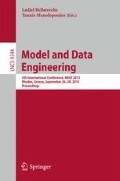Abstract
During the last years, various MOF-based modeling languages became de-facto standards in their field of application. Due to their common application and dissemination the need for extending these languages also increased in order to integrate domain-specific concepts or facilitate interoperability and tool support. However, only the minority of MOF-based modeling languages provides an extension mechanism and even those defining one, reveal some syntactical issues (e.g., BPMN). Also MOF itself does not provide an integrated and consistent extension mechanism. We therefore proclaim the application of the UML-based profile mechanism for extending the abstract syntax of MOF-based languages while keeping their original meta models unaffected. Further, the application of the Diagram Definition (DD) standard for extending the concrete syntax is outlined and both aspects are integrated. The research article proposes a generic extension method for MOF-based languages based on existing concepts and constructs from the MOF environment. In this context, the article also discusses the positions of the Profiles package and the Diagram Graphics (DG) package within the OMG meta hierarchy.
Access this chapter
Tax calculation will be finalised at checkout
Purchases are for personal use only
Notes
- 1.
Also, this aspect demarcates our work from rather formally driven DSL approaches.
References
OMG: business process model and notation (BPMN) - version 2.0. Object Management Group (OMG) (2011)
Braun, R.: Towards the state of the art of extending enterprise modeling languages. In: MODELSWARD (2015)
Atkinson, C., Gerbig, R., Fritzsche, M.: Modeling language extension in the enterprise systems domain. In: Proceedings of the 17th IEEE EDOC, pp. 49–58 (2013)
Bjeković, M., Proper, H.A., Sottet, J.-S.: Enterprise modelling languages. In: Shishkov, B. (ed.) BMSD 2013. LNBIP, vol. 173, pp. 1–23. Springer, Heidelberg (2014)
Braun, R.: Behind the scenes of the bpmn extension mechanism - principles, problems and options for improvement. In: MODELSWARD (2015)
Braun, R., Esswein, W.: Classification of domain-specific BPMN extensions. Lect. Notes Bus. Inf. Process. 147, 42–57 (2014)
Esswein, W., Weller, J.: Method modifications in a configuration management environment. In: Proceedings of the ECIS, 2002–2013 (2007)
OMG: meta object facility (MOF) core specification, version 2.4.2 (2014)
Wand, Y., Weber, R.: Research commentary: information systems and conceptual modeling - a research agenda. Inf. Syst. Res. 13(4), 363–376 (2002)
Pfeiffer, D., Gehlert, A.: A framework for comparing conceptual models. In: Proceedings of the EMISA Workshop, pp. 108–122 (2005)
Kopp, O., Görlach, K., Karastoyanova, D., Leymann, F., Reiter, M., Schumm, D., Sonntag, M., Strauch, S., Unger, T., Wieland, M., et al.: A classification of BPEL extensions. J. Syst. Integr. 2(4), 3–28 (2011)
Pardillo, J.: A systematic review on the definition of UML profiles. In: Petriu, D.C., Rouquette, N., Haugen, Ø. (eds.) MODELS 2010, Part I. LNCS, vol. 6394, pp. 407–422. Springer, Heidelberg (2010)
Atkinson, C., Gutheil, M., Kennel, B.: A flexible infrastructure for multilevel language engineering. IEEE Trans. Softw. Eng. 35(6), 742–755 (2009)
Del Fabro, M.D., Valduriez, P.: Towards the efficient development of model transformations using model weaving and matching transformations. Softw. Syst. Model. 8(3), 305–324 (2009)
Fondement, F., Muller, P.-A., Thiry, L., Wittmann, B., Forestier, G.: Big metamodels are evil. In: Moreira, A., Schätz, B., Gray, J., Vallecillo, A., Clarke, P. (eds.) MODELS 2013. LNCS, vol. 8107, pp. 138–153. Springer, Heidelberg (2013)
OMG: unified modeling language, infrastructure, version 2.4.1. OMG (2011)
OMG: diagram definition (DD), version 1.0 (2012)
OMG: meta object facility (MOF) 2.0 Query/View/Transformation (QVT), version 1.2 (2015)
Selic, B.: A systematic approach to domain-specific language design using UML. In: 10th IEEE International Symposium on Object and Component-Oriented Real-Time Distributed Computing, pp. 2–9 (2007)
Acknowledgement
This research was funded by the German Research Foundation (DFG) within the research project SFB Transregio 96.
Author information
Authors and Affiliations
Corresponding author
Editor information
Editors and Affiliations
Rights and permissions
Copyright information
© 2015 Springer International Publishing Switzerland
About this paper
Cite this paper
Braun, R., Esswein, W. (2015). Towards an Integrated Method for the Extension of MOF-Based Modeling Languages. In: Bellatreche, L., Manolopoulos, Y. (eds) Model and Data Engineering. Lecture Notes in Computer Science(), vol 9344. Springer, Cham. https://doi.org/10.1007/978-3-319-23781-7_9
Download citation
DOI: https://doi.org/10.1007/978-3-319-23781-7_9
Published:
Publisher Name: Springer, Cham
Print ISBN: 978-3-319-23780-0
Online ISBN: 978-3-319-23781-7
eBook Packages: Computer ScienceComputer Science (R0)

